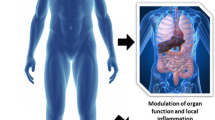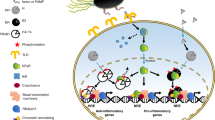Abstract
Introduction
Gender-specific immune responses have been found after trauma-hemorrhage. Male and female sex hormones seem to be responsible for this gender dimorphism. Alterations in sex hormone receptor expression in mice appear to contribute to the immunomodulatory effect of sex hormones after blood loss. The effect of surgical trauma on the expression of sex hormone receptors in peripheral blood mononuclear cells (PBMCs) from patients, however, remains unknown.
Materials and methods
PBMCs were obtained from 14 patients (7 men and 7 women) undergoing major abdominal surgery preoperatively and 2 h postoperatively. The expression of the androgen and the estrogen α- and β- receptors were determined by reverse transcriptase polymerase chain reaction (RT-PCR). β-Actin was used as housekeeping gene.
Results
The results indicate that surgical trauma has no influence on the expression of the androgen receptor and the estrogen receptors α and β in male and female patients.
Discussion
The data demonstrate that, in contrast to mice, no alterations in the expression of androgen and estrogen hormone receptors were evident after surgery in patients. Thus, differences in the expression of sex hormone receptors do not appear to be responsible for the gender-specific immune response after surgery.




Similar content being viewed by others
References
Angele MK, Schwacha MG, Ayala A, Chaudry IH (2000) Effect of gender and sex hormones on immune responses following shock. Shock 14(2):81–90
Wichmann MW, Zellweger R, DeMaso CM, Ayala A, Chaudry IH (1996) Enhanced immune responses in females, as opposed to decreased responses in males following haemorrhagic shock and resuscitation. Cytokine 8(11):853–863
Zellweger R, Wichmann MW, Ayala A, Stein S, DeMaso CM, Chaudry IH (1997) Females in proestrus state maintain splenic immune functions and tolerate sepsis better than males. Crit Care Med 25(1):106–110
Wichmann MW, Ayala A, Chaudry IH (1997) Male sex steroids are responsible for depressing macrophage immune function after trauma-hemorrhage. Am J Physiol 273(4 Pt 1):C1335–C1340
Angele MK, Knoferl MW, Ayala A, Bland KI, Chaudry IH (2001) Testosterone and estrogen differently effect Th1 and Th2 cytokine release following trauma-haemorrhage. Cytokine 16(1):22–30
Angele MK, Ayala A, Cioffi WG, Bland KI, Chaudry IH (1998) Testosterone: the culprit for producing splenocyte immune depression after trauma hemorrhage. Am J Physiol 274(6 Pt 1):C1530–C1536
Angele MK, Ayala A, Monfils BA, Cioffi WG, Bland KI, Chaudry IH (1998) Testosterone and/or low estradiol: normally required but harmful immunologically for males after trauma-hemorrhage. J Trauma 44(1):78–85
Angele MK, Knoferl MW, Schwacha MG, Ayala A, Cioffi WG, Bland KI, Chaudry IH (1999) Sex steroids regulate pro- and anti-inflammatory cytokine release by macrophages after trauma-hemorrhage. Am J Physiol 277(1 Pt 1):C35–C42
Knoferl MW, Diodato MD, Angele MK, Ayala A, Cioffi WG, Bland KI, Chaudry IH (2000) Do female sex steroids adversely or beneficially affect the depressed immune responses in males after trauma-hemorrhage? Arch Surg 135(4):425–433
Wichmann MW, Muller C, Meyer G, Adam M, Angele MK, Eisenmenger SJ, Schildberg FW (2003) Different immune responses to abdominal surgery in men and women. Langenbecks Arch Surg 387(11–12):397–401
Wichmann MW, Inthorn D, Andress HJ, Schildberg FW (2000) Incidence and mortality of severe sepsis in surgical intensive care patients: the influence of patient gender on disease process and outcome. Intensive Care Med 26(2):167–172
Schneider CP, Nickel EA, Samy TS, Schwacha MG, Cioffi WG, Bland KI, Chaudry IH (2000) The aromatase inhibitor, 4-hydroxyandrostenedione, restores immune responses following trauma-hemorrhage in males and decreases mortality from subsequent sepsis. Shock 14(3):347–353
Leav I, Lau KM, Adams JY, McNeal JE, Taplin ME, Wang J, Singh H, Ho SM (2001) Comparative studies of the estrogen receptors beta and alpha and the androgen receptor in normal human prostate glands, dysplasia, and in primary and metastatic carcinoma. Am J Pathol 159(1):79–92
Malucelli A, Sauerwein H, Pfaffl MW, Meyer HH (1996) Quantification of androgen receptor mRNA in tissues by competitive co-amplification of a template in reverse transcription-polymerase chain reaction. J Steroid Biochem Mol Biol 58(5–6):563–568
Moutsatsou P, Kassi E, Creatsas G, Coulocheri S, Scheller K, Sekeris CE (1998) Detection of oestrogen receptor variants in endometrium, myometrium, leiomyoma and peripheral blood mononuclear cells: comparison to variants present in breast cancer. J Cancer Res Clin Oncol 124(9):478–484
Phiel KL, Henderson RA, Adelman SJ, Elloso MM (2005) Differential estrogen receptor gene expression in human peripheral blood mononuclear cell populations. Immunol Lett 97(1):107–113
Stygar D, Westlund P, Eriksson H, Sahlin L (2006) Identification of wild type and variants of oestrogen receptors in polymorphonuclear and mononuclear leucocytes. Clin Endocrinol (Oxf) 64(1):74–81
Sader MA, McGrath KC, Hill MD, Bradstock KF, Jimenez M, Handelsman DJ Celermajer DS, Death AK (2005) Androgen receptor gene expression in leucocytes is hormonally regulated: implications for gender differences in disease pathogenesis. Clin Endocrinol (Oxf) 62(1):56–63
Kahlke V, Angele MK, Schwacha MG, Ayala A, Cioffi WG, Bland KI, Chaudry IH (2000) Reversal of sexual dimorphism in splenic T lymphocyte responses after trauma-hemorrhage with aging. Am J Physiol Cell Physiol 278(3):C509–C516
Saceda M, Lindsey RK, Solomon H, Angeloni SV, Martin MB (1998) Estradiol regulates estrogen receptor mRNA stability. J Steroid Biochem Mol Biol 66(3):113–120
Yeap BB, Wilce JA, Leedman PJ (2004) The androgen receptor mRNA. Bioessays 26(6):672–682
Samy TS, Knoferl MW, Zheng R, Schwacha MG, Bland KI, Chaudry IH (2001) Divergent immune responses in male and female mice after trauma-hemorrhage: dimorphic alterations in T lymphocyte steroidogenic enzyme activities. Endocrinology 142(8):3519–3529
Mor G, Yue W, Santen RJ, Gutierrez L, Eliza M, Berstein LM, Harada N, Wang J, Lysiak J, Diano S, Naftolin F (1998) Macrophages, estrogen and the microenvironment of breast cancer. J Steroid Biochem Mol Biol 67(5–6):403–411
Schmidt M, Kreutz M, Loffler G, Scholmerich J, Straub RH (2000) Conversion of dehydroepiandrosterone to downstream steroid hormones in macrophages. J Endocrinol 164(2):161–169
Acknowledgment
This investigation was supported by a grant from the Deutsche Forschungsgesellschaft DFG AN 357/1-1 and a grant of the Münchner Medizinische Wochenschrift (MMW).
Author information
Authors and Affiliations
Corresponding author
Rights and permissions
About this article
Cite this article
Brechenmacher, S.A., Bruns, C.J., Van den Engel, N.K. et al. Influence of surgical trauma on the mRNA expression of sex hormone receptors in PBMCs in male and female patients. Langenbecks Arch Surg 393, 871–876 (2008). https://doi.org/10.1007/s00423-008-0304-8
Received:
Accepted:
Published:
Issue Date:
DOI: https://doi.org/10.1007/s00423-008-0304-8




